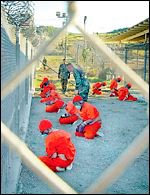
By a vote of 84-14, the U.S. Senate approved a defense authorization bill that contains a provision, known now as the Graham/Levin amendment, that would severely restrict the right of terror suspects held in Guantanamo Bay, Cuba [pictured], to challenge their detention in federal court.
The original amendment, offered by Senator Lindsey Graham, would have barred federal courts from hearing habeas petitions from these particular detainees. The modified amendment, which passed as part of this authorization bill, permits the U.S. Court of Appeals for the D.C. Circuit "to review whether the designations [as enemy combatants] were based on a preponderance of evidence, and to consider whether the [military] tribunals - which don't allow lawyers and rely heavily on secret, classified evidence - use constitutional procedures."
While Senator Graham claimed this bill would "would end legal confusion at Guantanamo," a Duke professor stated that, "There is a great deal of ambiguity and uncertainty in what they did, and I would not predict how the courts will decide this...."
The modified amendment offers some judicial review to these detainees. However, as a prominent legal scholar noted, "this bill... would still cut off numerous sorts of challenges to the Administration's detention policies and practices and GTMO...."
The debate regarding the rights of the detainees has been spirited and contentious. Indeed, Senator Jeff Bingaman noted in a press release:
The current practice of holding detainees or prisoners indefinitely, without affording them basic due process rights, has been widely criticized in this country and throughout the world. For a country such as ours that has consistently advocated for the rule of law, the policies of the current administration are nothing short of a major embarrassment....Senator Carl Levin stated on the floor of the Senate:
I have never advocated that the Department of Defense release these prisoners but, rather, have said that they should be tried in the criminal justice system or they should be tried in the military justice system, but they should be tried somewhere. I believe it is appropriate to ensure that they do not indefinitely remain in a state of legal limbo and are afforded basic due processr ights.
we must operate according to our Constitution. Our laws and the review which is provided for now, if we agree to this amendment to the adopted Graham amendment, would explicitly make it clear that the review of a court would look at whether standards and procedures that have been agreed to are consistent with our Constitution and our laws. The other problem which I focused on last Thursday with the first Graham amendment was that it would have stripped all the courts, including the Supreme Court, of jurisdiction over pending cases. What we have done in this amendment, we have said that the standards in the amendment will be applied in pending cases, but the amendment will not strip the courts of jurisdiction over those cases. For instance, the Supreme Court jurisdiction in Hamdan is not affected.
DNSI
0 Comments:
Post a Comment<< Home